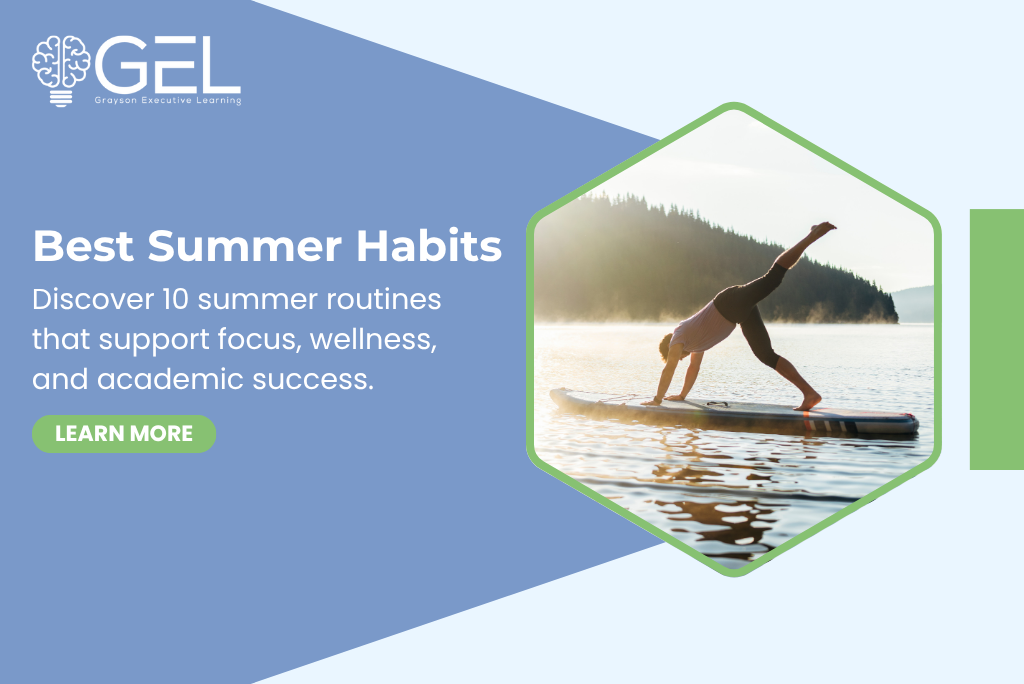Summer gives us the gift of time and space. The longer days, slower pace, and warm weather all create the perfect opportunity to reset. But as back-to-school season approaches, it is not just about soaking up the last rays of sunshine. It is also a strategic time to build habits that support a smoother, healthier, and more focused transition into the fall semester.
The good news is that many of the habits that help teens and young adults thrive in summer also lay the groundwork for academic and emotional success throughout the year.
Here are 10 of the best summer habits to help prepare for a strong, focused, and balanced fall semester.
Start Each Day with Hydration and Intention
When the weather is hot, it is easier to remember to drink water. But staying hydrated should not be seasonal. About 75 percent of Americans are chronically dehydrated, and during summer, the heat only makes that worse. Proper hydration supports focus, memory, mood, and energy, making it one of the simplest habits to carry into the school year.
Start with a tall glass of lemon water in the morning. This small ritual not only rehydrates the body but also sets a tone of intentionality and care for the day ahead.
Summer habit to keep: Keep a reusable water bottle with you and add sliced fruit or herbs to make it more enjoyable.
Create a Consistent Sleep Schedule
Long summer nights and irregular bedtimes can disrupt sleep routines. Research shows that sleep is essential for memory, emotional regulation, and immune function. One study found that people who sleep at least seven hours a night are three times less likely to catch a virus compared to those who sleep less.
As school approaches, begin winding down earlier and waking up at the same time each morning to reset your internal clock. You will head into the semester more alert and emotionally balanced.
Tip: Aim for 7 to 9 hours of sleep for teens and adults. For children, 10 to 12 hours is ideal.
Keep Moving Even in Small Doses
You do not need to run a marathon to feel the benefits of movement. Summer offers a great chance to explore physical activity in fun and flexible ways such as walking, swimming, biking, hiking, or dancing in your living room.
Experts recommend at least 150 minutes of moderate aerobic activity or 75 minutes of vigorous activity per week, plus strength training twice a week. But even five-minute movement breaks can increase blood flow, improve focus, and lift your mood.
Simple summer habit: Do 25 jumping jacks after every hour at your desk or take short evening walks as a family.
Make Mornings Count
During summer, it is tempting to sleep in and ease into the day. But shifting toward productive mornings can help ease the transition to earlier school schedules.
Start with something simple such as a short walk, five minutes of journaling, or a healthy breakfast. Morning exercise in particular can increase endorphins, boost your metabolism, and set a positive tone for the entire day.
What to try: Overnight oats, yogurt with fruit, or a smoothie to grab on the go.
Plan Ahead Just a Little
Even a few minutes of planning can transform your week. Use Sundays to review your upcoming schedule, prep meals, or organize your workspace. This habit reduces anxiety, builds executive function, and helps students feel more in control.
Studies show that planning in advance, even for just 8 to 10 minutes a day, can significantly improve productivity and reduce daily overwhelm.
Pro tip: Start using a calendar or planner now so it becomes second nature once school begins.
Focus on Fresh, Colorful Foods
Summer is the perfect time to lean into whole foods, especially colorful fruits and vegetables. Experts recommend five to nine servings of produce per day, which helps regulate energy, support immune health, and improve mood.
Simple snacks like grapes, watermelon, carrot sticks, and hummus are nutrient-rich and easy to pack. During back-to-school season, these same habits help with sustained focus and healthy eating on the go.
Habit to build: Include one fruit and one vegetable with every meal. Prep ahead so healthy snacks are easy to grab.
Practice Digital Mindfulness
With more free time comes more screen time. Unstructured tech use can disrupt sleep, reduce focus, and increase anxiety. Use the summer to help teens develop a healthier relationship with their devices.
Try designating certain hours as tech-free, encouraging face-to-face social time, and turning off screens an hour before bed.
Why it matters: Excessive screen time, especially before sleep, affects melatonin levels and brain function, making it harder to concentrate during the day.
Get Outside for Your Mind and Mood
Spending time outdoors boosts vitamin D, reduces stress, and supports emotional regulation. In Japan, there is even a term for it called forest bathing, the intentional act of immersing oneself in nature for better health.
Whether it is a picnic, a walk in the park, or lunch on the patio, building in regular outside time supports both cognitive and emotional performance, especially for students prone to anxiety or low motivation.
Keep it going: Aim for 30 minutes of outdoor time daily, even if it is just reading on the porch.
Build Independence Through Small Responsibilities
From organizing their own backpack to helping plan meals or doing chores well, summer offers a low-pressure time for teens and tweens to practice independence.
Building executive function is not just about academics. It is also about time management, task completion, and developing initiative. These skills directly translate to school success and reduce parental oversight come fall.
Tip: Start with daily routines your teen can own and gradually expand their responsibility.
Schedule Time to Slow Down and Reflect
Summer often invites a slower pace. But that sense of calm does not need to vanish with the school bell. Intentional rest, whether through reading, journaling, or mindfulness, helps students manage stress and build emotional resilience.
Just five minutes of meditation or quiet breathing can regulate the nervous system, improve sleep, and increase focus.
Try this: Set aside 10 to 15 minutes each week for tech-free downtime or reflective journaling.
Final Thoughts: Set the Tone Now for a Stronger Fall
Summer is not just for relaxing. It is for recharging. The habits students form now do not just support their health and happiness today. They set the stage for greater focus, resilience, and readiness once the semester begins.
Whether it is walking outside, staying hydrated, or making their own lunch, every small effort adds up. By building these healthy habits now, your student can walk into the school year not just prepared, but thriving.
How Can GEL Help Students Develop Executive Function?
Grayson Executive Learning (GEL) is a boutique Academic and ADHD/Executive Function Coaching practice that specializes in providing premium one-on-one academic coaching services to high school and college students with ADHD and executive function difficulties.
Click here to learn how we can help your student truly reach their academic potential while developing critical life and independence skills.
We look forward to serving you!


